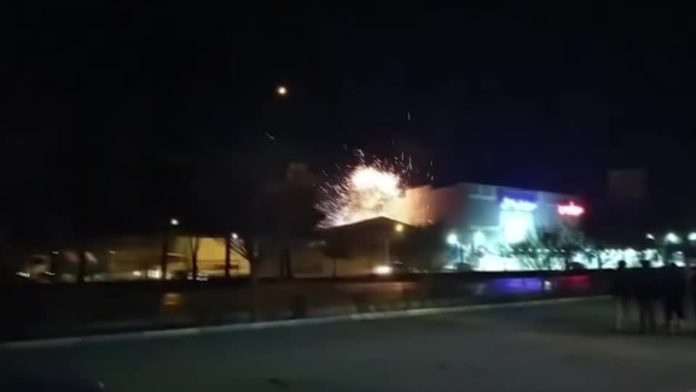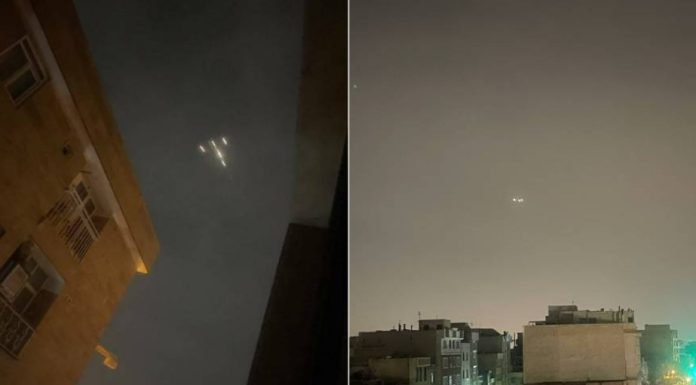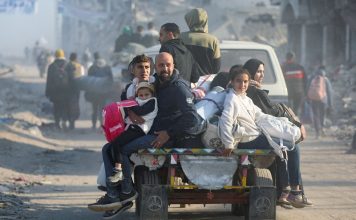By Kayhan Life Staff
The Iranian Ministry of Defense and Armed Forces Logistics said on Jan. 29 that its air defense system had foiled a mini-drone attack on one of its facilities in Isfahan.
Jan. 29, 2023, – #Isfahan #Iran
A loud explosion at a military plant in Iran's central city of Isfahan was caused by an "unsuccessful" drone attack, Iranian state media reported on Sunday, citing the defense ministry.https://t.co/XtWon029M4 pic.twitter.com/cbBp9dz21t— Kayhan Life (@KayhanLife) January 29, 2023
“Mini drones attacked a facility complex belonging to the Defense Ministry on Saturday evening [Jan. 28],” the statement said. “The complexes’ air defense system shut down one drone and trapped the other two in the defense grid, causing their explosion.”
“There were no casualties,” the statement added. “The roof of the building sustained minor damage.”
During a live television broadcast held shortly after the incident, Mohammad Reza Jan-Nesari, the Deputy Governor of Isfahan Province for security affairs, said: “The preliminary investigations indicate an explosion at a facility belonging to the Defense Ministry caused the sounds.”
“There were no casualties, but we are assessing the damage,” He added.
There were reports of explosions during the weekend at military and industrial facilities in Isfahan and Rasht, the capital of the northern province of Gilan and Azar Shahr, near Tabriz, the capital of the northwestern province of East Azerbaijan.
The strikes reportedly started Saturday night (Jan. 28) and continued the following morning. They reportedly targeted industrial sites, manufacturing missiles, unmanned combat aerial vehicles (UCAV), or battlefield UAVs, better known as drones.
The Iranian military reportedly activated its air defense systems in the northwestern province of Hamadan, Tehran, and Karaj, 35 miles northwest of Tehran.
According to unconfirmed reports, a mini drone hit a facility near Parchin Military Complex, 19 miles southeast of Tehran.
Air raid sirens reportedly went off at Hamadan’s Shahrokhi Airbase.
Photos posted on social media show unidentified aircraft flying over the capital Tehran.
Authorities in some regions have been quick to dismiss reports of drone attacks on military and industrial facilities.
According to state media, firefighters put out a massive fire that broke out on Jan. 29 at a factory refining motor oil in Shahid Salimi Industrial Park in Azar Shahr, in East Azerbaijan Province.
Preliminary reports showed that several oil containers had caught fire, causing an explosion.
In comments reported by the Tehran-based Tasnim news agency, Mohammad Honarbar, Director of East Azerbaijan Province Crisis Management, said several oil containers had caught fire, causing an explosion.
“The investigation into the cause of the explosion continues,” Mr. Honarbar explained. “We will provide more information soon. Meanwhile, the fire is under control and will be extinguished soon.”
According to unconfirmed reports, the explosions targeted a factory manufacturing alloys for UAV bodies, missiles, and explosives in the Shahid Salimi Industrial Park and a plant in Rasht producing polyester and fiberglass for UAV bodies.
A tweet by Kayhan London on Jan. 28 said: “Mini drone operations in several Iranian cities [targeting] a military facility in Isfahan, and a restricted area in Parchin, east of Tehran and a fire at the Shahid Salimi Industrial Park in Azar Shahr, near Tabriz.”
The tweet included undated footage taken at night, showing an explosion in an urban area. An unidentified man speaking off camera says: “Was it not a drone? It was a drone.”
Mohammad Marandi, an advisor to Iran’s nuclear negotiating team, warned about the consequences of the “foiled” drone attacks near Isfahan.
“It has not been a good week for the apartheid Zionist regime both inside and outside [the country],” Mr. Marandi tweeted on Jan. 29. “The defeat of [Prime Minister Benjamin] Netanyahu and his Western-backed terrorist allies in northern Iraq will have consequences. They must learn that punishment and defeat go hand in hand.”
The explosions in Iran follow a deadly shooting at a synagogue in East Jerusalem on Jan. 27 that left seven dead and injured at least three others.
Following the attack, the Israeli government held an emergency security meeting, during which Mr. Netanyahu noted that “Israel was ready for any scenario.”
“Although Israel does not want to escalate tension, it is ready for any scenario,” Netanyahu said.
Mini drones differ from UAVs. They do not have the same range. Therefore, the attacks could have come from inside Iran.
#Hezbollah on Saturday praised an attack in which a Palestinian gunman killed seven people and wounded three others on Friday at a synagogue in Jerusalem, the Iran-backed group said in a statement.https://t.co/3aIAc3DH45
— Kayhan Life (@KayhanLife) January 29, 2023
Also, the attacks on military and industrial sites exposed vulnerabilities in the Islamic Republic’s security and intelligence capabilities.
In an interview with the Tehran-based Mehr News Agency, following a series of explosions at military and nuclear sites in 2022, Mohsen Rezaei, former Secretary of the Expediency Council, said: “The country is suffering from a security breakdown. It needs a comprehensive security cleansing, including purging elements infiltrating ministries and organizations.”
Mr. Rezaei made the comments while Hassan Rouhani was president. Rezaei, a former commander of the Islamic Revolutionary Guards Corps (IRGC) and current Vice President of Economic Affairs in the government of President Ebrahim Raisi, is one of the most influential officials in the Islamic Republic. However, Iran’s Supreme Leader, Ayatollah Ali Khamenei, is the commander-in-chief. Any cleansing of the military would have to be ordered by Khamenei.













